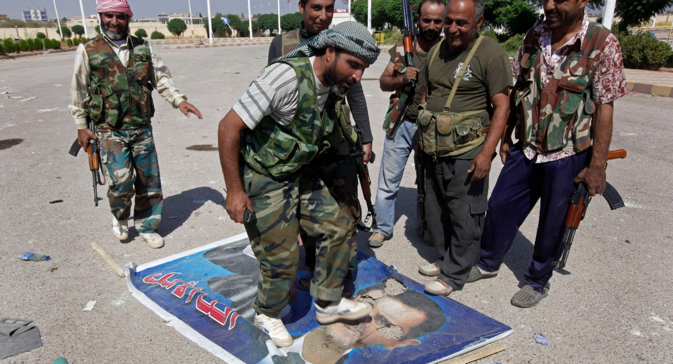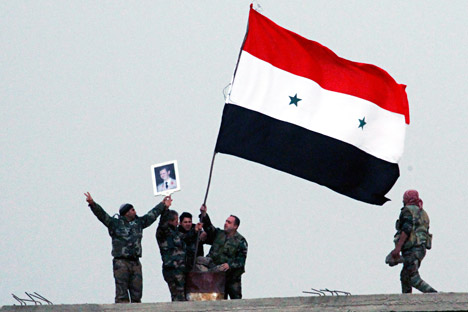Risks of the "Big Game"

A Free Syrian Army fighter from the Al-Faruk brigade, center, steps on a portrait of Syrian President Bashar Assad
APAn official representative of the US administration has warned Russia that it risks being isolated if it continues supporting Bashar Assad's regime in Syria. Other western leaders are also concerned, but rather vaguely - no one has a clear idea of what should be done in the crisis zone. Thus the split in position: "not to let the little green men into Latakia" or "let the Russians try, maybe they'll succeed in doing something."
If we distance ourselves from the ideological preconceptions, with which all of Russia's actions are perceived, we may understand why the united front of the fight against the Islamic State is not working, even though, everyone will agree, it is vitally needed. There is a series of basic discrepancies, either stated or not entirely.
First, due to inertia IS is seen as a terrorist group, which is why everyone is speaking about an anti-terrorist campaign. This is not the right definition. In reality, the problem can be traced back to the beginning of the 2000s when the international fight against terrorism, declared by the Bush administration, stimulated processes that culminated in the current chaos. Also, even if the world is now confronted by terrorism, IS represents a new type and level of terrorism. The Islamists headed by al-Baghdadi are basically overrunning and destroying the entire institutional structure of the Middle East, intending to rebuild not only the ideological but also the governmental-political order.
Be that as it may, IS deserves to be countered by the most serious measures with the use of all the arsenal that countries have at their disposal. The West continues viewing IS through the prism of familiar concepts of the fight against terrorism while Russia is inclined to take up measures that are usually characteristic of interstate wars.
Secondly, ideas on Syria's future also do not correspond. The West's obsession with Bashar Assad is related to the question of who will manage Syria after the conflict. Here, the original meaning of talks on sharing powers with the opposition, the renewal of the Geneva process and so on, come into focus.
Russia, as is known, supported the Geneva and the Moscow processes, albeit with its own positions, but now, as it appears, it is convinced that the problem is much more acute. The problem is what will happen with the Syria that existed before. The country has practically been divided into zones of control (or lack thereof) and it is difficult to imagine the reconstruction of former statehood. Now the question is where will it be possible to dig in to stop IS's advance.
It is clear that the issue of power in a reformatted system, whatever it may be called in the future, will arise. No doubt power will have to be shared, but first it is important to understand what exactly will remain. Concerning the current moment, many in Moscow reasonably believe that a coalition in the conditions of a massive external attack is good only when the various forces, having set their differences aside, sincerely unite against a common enemy. Syria is not the case. Both the government's and the opposition's level of obstinacy is close to absolute. And to use force to impose cooperation in such a situation (theoretically external players can try) means to condemn the coalition to immediate failure with a clear result: the enthronement of IS in Damascus.
Therefore, despite the above-mentioned divergences, is it possible for the leading players to reach an agreement on joint actions in Syria? The inflow of refugees into Europe, and its complete inability to do anything about it, is quickly changing the public's mood in the Old World. Now the mood is dominated by the opinion that to stop the situation, Europe should to everything possible, and not on its territory. The American position is dictated by a tangle of various motifs, but in general it is no longer monolithic. Public declarations and real views do not always correspond. Meanwhile, opposition to Moscow is determined not by the desire to remove Assad, but by fears that Russia will strengthen its position in the region. But this is an issue of a rational balance of interests, which is always easier to solve (though still very difficult) in comparison with when the situation concerns ideological preferences.
It is clear that by initiating the anti-IS campaign and getting more involved in Middle Eastern intrigues, Russia is taking risks. Besides the threat of material and, more importantly, human losses, which cannot be denied, especially considering the inhumane enemy that will be opposed, there are always doubts related to attaining the objective. There are no guarantees of success, especially in this complex situation where everyone is fighting each other and stabbing each other in the back. Russian public opinion must prepare itself for various scenarios.
It should also be recognized that Russia's decision to participate more actively in the Syrian battle is coming from its past experience. In international politics it is action and not criticism that is valued above all else. It is action that wins points and elevates status. Yet, the opposite may occur. However, without risk there is no "Big Game."
First published in Russian by Rossiyskaya Gazeta.
All rights reserved by Rossiyskaya Gazeta.
Subscribe
to our newsletter!
Get the week's best stories straight to your inbox
